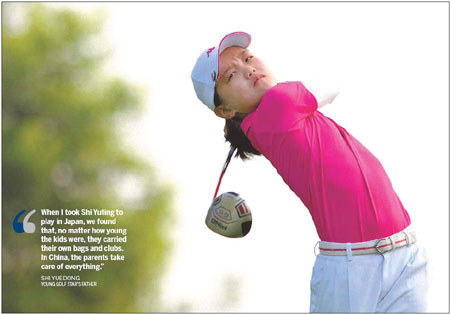Top News
Watch this space
(China Daily)
Updated: 2011-02-27 09:49
 |
Large Medium Small |
|
 |
While China's first-generation golfers struggled to go from caddying to the clubroom, the country's future superstars on the fairways are nurtured by parental support and investment. Tang Yue eyes two prodigies.
Liang Wenchong may have had a late start as a teenager, but some children in China are swinging their clubs before they are even toddling steadily. Most of them are guided by parents with an avid interest in the sport.
Take, for example Shi Yuting - one of the most promising young golfers though barely in her teens. She had already played former world champion Ai Miyazato when she was just 9 years old.
At last year's HSBC National Junior Championship, Shi Yuting won a place in the Shanghai pro-am, at which she matched American star Phil Mickelson and beat Australia's former top-10 player Adam Scott over a par-three hole.
While many of the first and second generation of the Chinese golfers started as caddies on the greens, most of the youngest newcomers are backed by supporting families.
Shi was born in Japan, and moved back to China with her parents when she was 5. Her father brought her to the golf course two years later and started her lessons.
"I had never played golf before I went to Japan in 1992. Very few people were familiar with that sport in China at the time," Shi Yuedong, 47, tells China Daily.
"After I came back to China, I brought Yuting to the golf course when I was playing and she showed great interest."
Within a year, Shi finished in the top three in her age group at a national competition and was showing great strength, consistency and maturity on the course.
In 2007, Shi was sent to the Huangshan Golf Academy and her mother, Liu Yuejin went with her. One year later, Shi's four-year-younger sister, Shi Yuli, followed her footsteps at 5. But they later returned to Shanghai the next year for their academic studies.
Yuting now plays for three hours after school everyday and competes all over the world while her younger sister still plays for fun during weekends - but she's already in the top three at national level.
"If you go to the course nowadays in China, there are a lot of 4- and 5-year-olds playing. Some are even younger. It is so common," says Shi Yuedong.
Thanks to an expanding pool of players, China enjoys rising competitiveness against neighboring golf powerhouses Japan and South Korea.
At last year's Guangzhou Asiad, China won two silver medals, including one by 14-year-old Yan Jing, who became the first Chinese women golfer to win a medal at the Asian Games.
She was born in the US when her father, Yan Ming, was working there as a commentator for ESPN, and first played when she was just 2 years old.
"It was not only the year of Tiger Woods. Korean Se Ri Pak was also the super star that year as she won the LPGA Championship in the US," says Yan Ming. "Her success was so inspiring that I wanted Yan Jing to have a go at it, too."
To better hone their skills, tens of Chinese teenagers are now studying in the US, and expected to bring the standards of Chinese golf to exceptional standards when they return.
"The kids now have much better equipment than we had," says Liang Wenchong. "But a player's future has not so much to do with family wealth than with parental teachings, education and the player's own attitude.
"I was a caddy when I was learning golf, and it actually helped me. I could observe how the player thought over difficult situations and played."
Shi Yuedong expressed the same concerns, saying Chinese parents should keep the kids from being too pampered.
"When I took Shi Yuting to play in Japan, we found that, no matter how young the kids were, they carried their own bags and clubs. In China, the parents take care of everything," he says.
"Chinese children should learn to be more independent and pay more attention to the etiquette of the game. Japanese young golfers are doing much better than us at this."
| 分享按钮 |